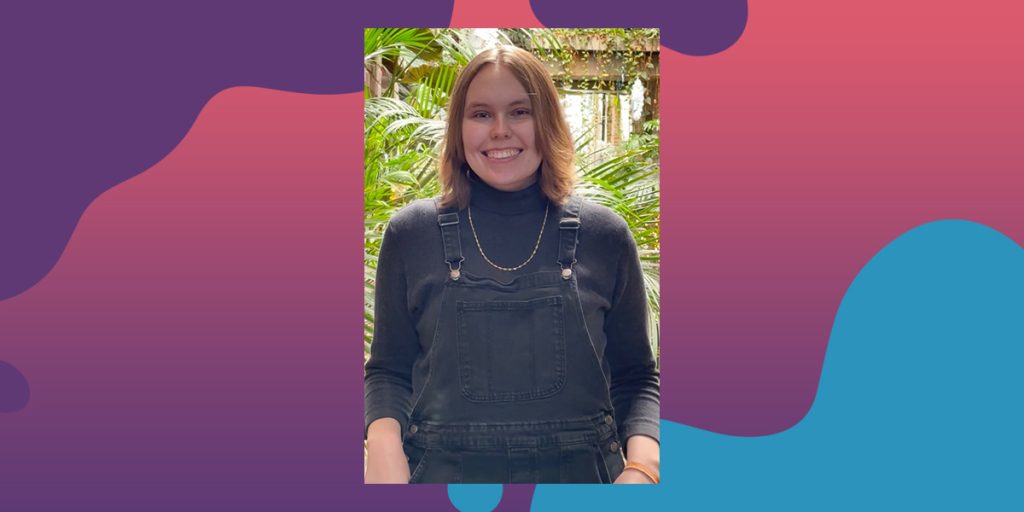Blog Post
Confirming My Asexuality in a Sexcentric Society

By Nicole Young
Sex is an integral part of nearly everything. Songs are about sex, movies have sex, books have sex, magazines discuss sex, and sex is on social media. It’s something we cannot escape.
Even when we are too young to know what sex is, we are fed a downplayed version of it — many of our classic favorite childhood movies revolve around “finding true love,” or, “true love’s kiss” in addition to vague sexual innuendos to humor the parents who watch with their children. Our culture is so dependent on one type of relationship — one that is romantic, sexual, and monogamous — that anything that deviates from this is often frowned upon by the general population.
Just like compulsory heterosexuality, we are taught from a young age to desire romance and sex — that romantic relationships can’t exist without sex, making it an inevitable line we all must cross.
Growing up surrounded by something you “should” want but don’t can be terrifying and isolating.
Growing up surrounded by something you “should” want but don’t can be terrifying and isolating.
I knew I was a lesbian before I knew that I was asexual, and I had heard stories of life-changing epiphanies. People who previously thought they were asexual discovered that they were only sexually attracted to women, and landing on the lesbian label made the rest fall into place. This didn’t work out for me; I knew I was romantically attracted to women, but my sexual attraction didn’t follow like I thought it was supposed to (and that’s okay).
Then, when my friends began to have sex and sexual relationships, I felt like I was being left behind and infantilized and that I would need to “catch up.” As a young person with a limited view of the world, all I knew was that sex was in almost all media, which is created by adults, so all adults want to partake in it; therefore, I couldn’t be an adult until I did too. Our society is so sex-centric that being asexual—especially in one’s formative years—feels like another form of exclusion added on to all of the other growing pains young queer people must face.
As a young person with a limited view of the world, all I knew was that sex was in almost all media, which is created by adults, so all adults want to partake in it; therefore, I couldn’t be an adult until I did too.
When I was first coming to terms with the fact that I was asexual, I viewed it in a very black and white manner (you either experience sexual attraction and want to have sex or don’t) and therefore struggled to confirm my identity. In reality, almost every ace person will describe a different experience; some are completely repulsed by the idea, some desire to have sex but aren’t sexually attracted to others, some don’t experience sexual attraction unless they have an established emotional connection with someone already, and there are multitudes of specificities in between. I’m asexual and homoromantic myself, but many identify as demisexual, gray asexual, and more that fall under the ace umbrella. All are valid!
If there is one message I could tell my younger confused self, it would be that, like most things, asexuality—and sexuality in general—is a spectrum. There is no one “correct” way to experience it, and it’s okay and normal for your experience to differ from others’. Additionally, if you feel that you experience sexual attraction differently than others, it is okay to “try on” the label to see if it feels comfortable—commitment is not required, there are no “rules,” and it is normal for one’s labels to change as they discover more about themselves.
Asexuality—and sexuality in general—is a spectrum. There is no one “correct” way to experience it, and it’s okay and normal for your experience to differ from others’.
With the “asexual” label in particular, I’ve been met with questions about why I feel I need to label myself or why I need to talk about it. To that, I say this:
Asexuality can sound simple in definition, but it’s quite vast, and the label has helped myself and others understand ourselves and how we view and interact with the world. Understanding this part of myself has led to other important discoveries and plays a pivotal role in how I navigate relationships. Additionally, embracing my asexuality has allowed me to connect with others like me and be more comfortable and confident in myself. For these reasons, I am grateful to have built this foundation upon which I can continue to understand the complexities of sexuality while also feeling content with my own.
Even with multiple identities within the ace label, the asexual community is still one of the smallest groups within the overall LGBTQIA+ community, making it difficult for young people to find others like them with which to relate. Still, we’re here, and I think there are more of us than statistics claim.
– Nicole Young (she/her) is a queer writer, streamer, and professional copyeditor based in the midwest U.S. You can find her on Instagram and Twitch.